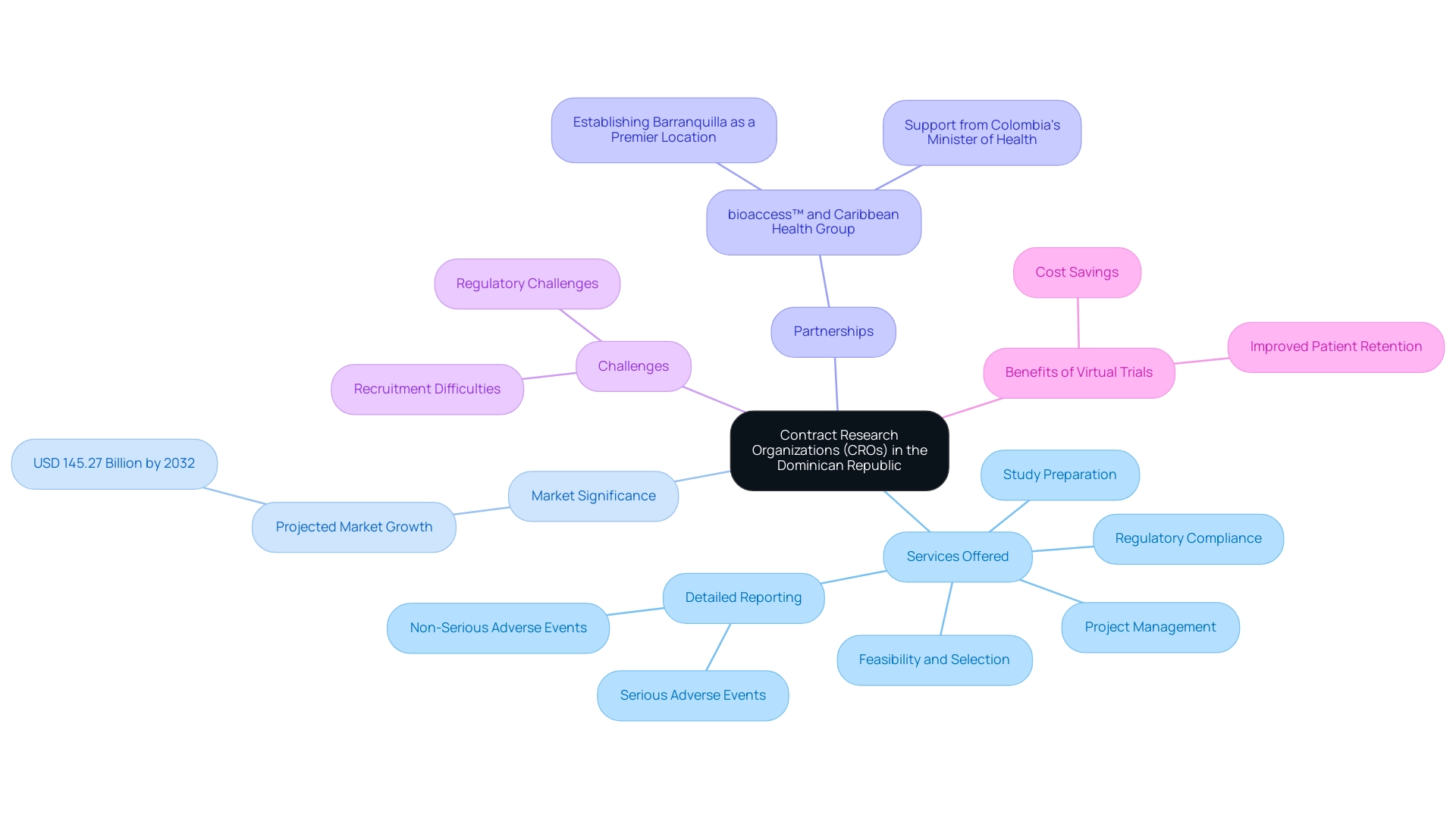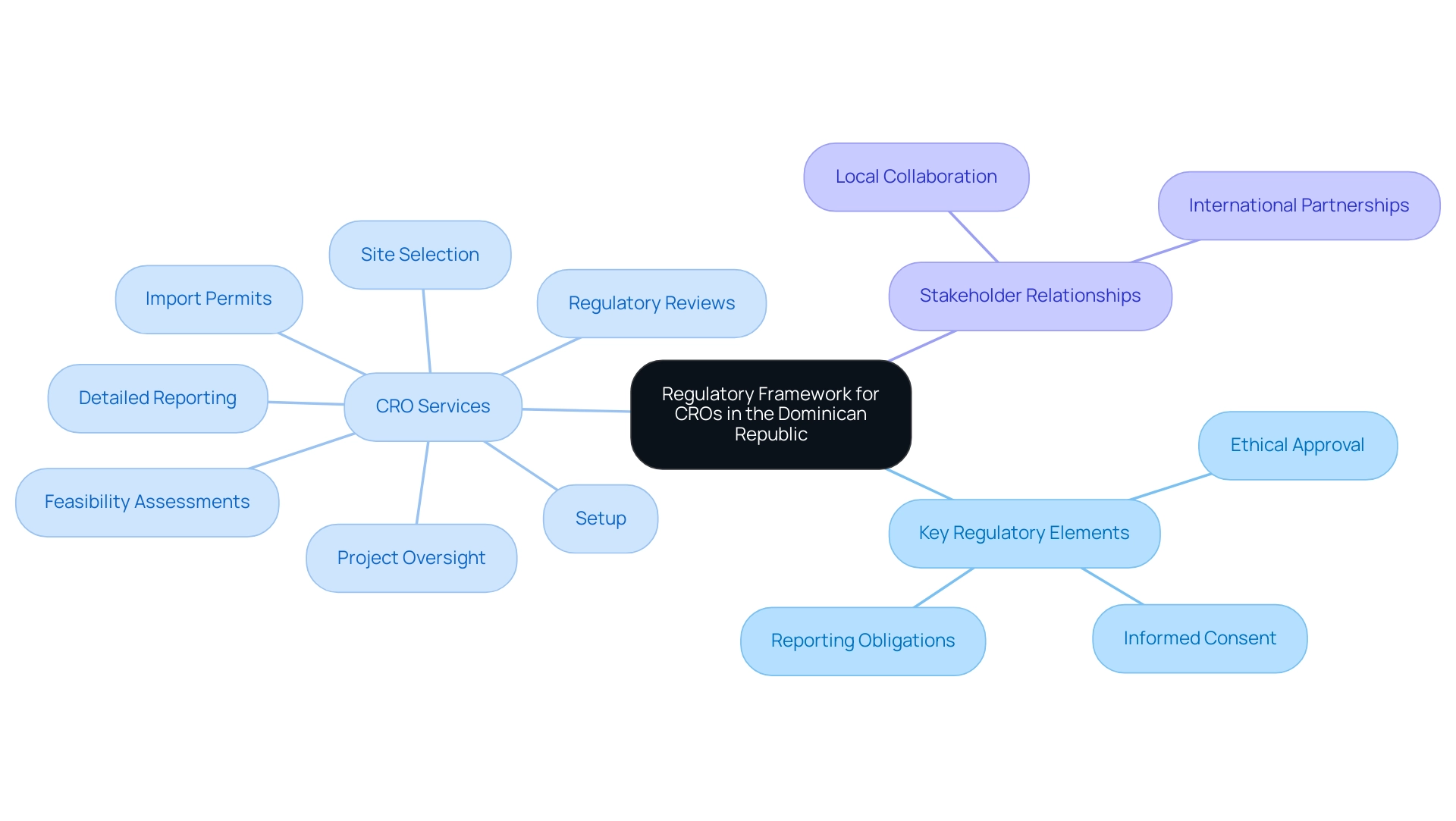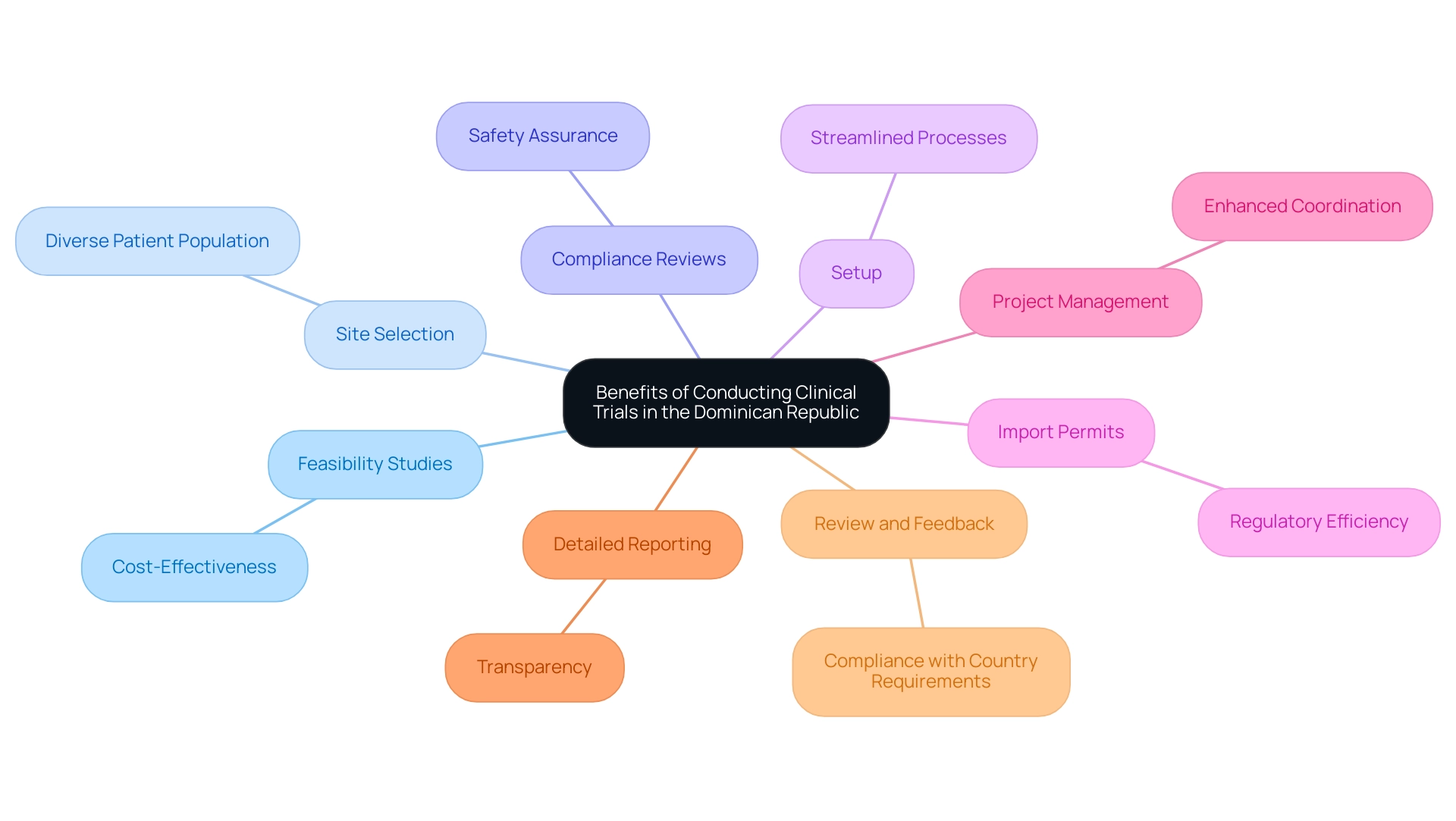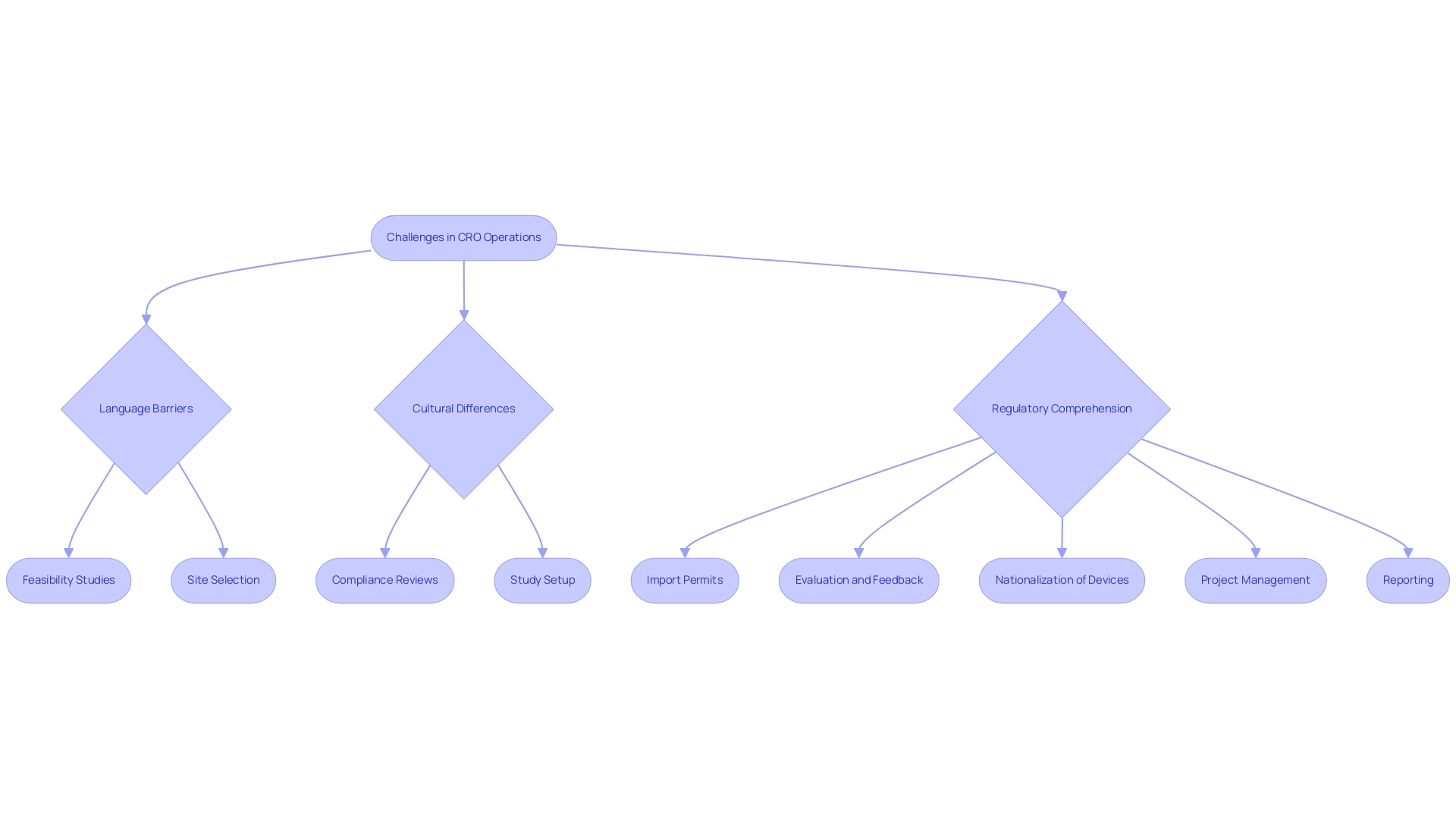Overview
Choosing the right Contract Research Organization (CRO) in the Dominican Republic involves evaluating specialized expertise, local market knowledge, and a proven track record in relevant therapeutic areas. The article emphasizes that these criteria, along with strong communication and adaptability, are critical for ensuring successful research outcomes and navigating the complexities of clinical trials in the region.
Introduction
In the realm of clinical research, Contract Research Organizations (CROs) play a pivotal role, particularly in regions like the Dominican Republic where they bridge the gap between pharmaceutical innovation and regulatory compliance. As the demand for efficient and effective clinical trials escalates, understanding the contributions of CROs becomes essential for stakeholders in the healthcare and research sectors.
This article delves into the multifaceted landscape of CROs in the Dominican Republic, exploring:
- Their operational significance
- The regulatory frameworks they navigate
- The benefits of conducting trials in this locale
- The criteria for selecting the right CRO
- The challenges they face
With a burgeoning market projected to reach USD 145.27 billion by 2032, the insights provided herein will illuminate the critical functions of CROs and their influence on the future of clinical research in Latin America.
Understanding Contract Research Organizations (CROs) in the Dominican Republic
Contract Research Organizations (CROs) act as essential collaborators in overseeing and conducting studies for pharmaceutical, biotechnology, and medical device firms. In the Dominican Republic, the Dominican Republic Contract Research Organization is crucial in ensuring adherence to both local regulations and international standards, thus facilitating high-quality clinical research. They offer an extensive range of services that encompasses:
- Feasibility and selection of research locations
- Investigator selection
- Regulatory compliance
- Study preparation
- Import permit and nationalization of investigational devices
- Project management
- Detailed reporting on study status, including serious and non-serious adverse events
As the market for CROs is projected to reach USD 145.27 billion by 2032, the growing significance of these organizations is evident. Furthermore, the partnership between bioaccess™ and Caribbean Health Group seeks to establish Barranquilla as a premier location for medical studies in Latin America, backed by initiatives from Colombia's Minister of Health, who actively supports this endeavor. This partnership is designed to tackle shared obstacles encountered by medical device startups, including:
- Regulatory challenges
- Recruitment difficulties
While improving ambulatory services in Colombia, resulting in over a 50% decrease in recruitment time and 95% retention rates.
The advantages of virtual research studies further highlight the changing environment of medical investigations, with a significant rise in successful projects showcasing the efficacy of contract research organizations in the area. This trend emphasizes the significance of contract research organizations in managing the intricacies of study management and ensuring that research aligns with particular regulatory standards and goals, ultimately improving the chances of study success.

Navigating the Regulatory Framework for CROs in the Dominican Republic
In the Dominican Republic, a Dominican Republic Contract Research Organization must navigate a complex regulatory framework that encompasses guidelines set forth by the Ministry of Health, ethical review committees, and international protocols like Good Clinical Practice (GCP). Following these regulations is crucial for guaranteeing that research studies are carried out ethically and in accordance with established standards. Key elements of this framework include:
- The necessity of obtaining ethical approval prior to commencing any study
- Securing informed consent from participants
- Fulfilling specific reporting obligations
CROss offer extensive management services for studies that include:
- Feasibility assessments
- Site selection
- Regulatory reviews
- Setup
- Import permits
- Project oversight
- Detailed reporting of study progress and adverse occurrences
The trial setup process involves detailed planning and coordination to ensure all regulatory requirements are met, while review processes assess adherence to ethical standards and protocols throughout the study. This capability not only supports the regulatory requirements but also enhances the effectiveness of clinical research initiatives.
As the Ministry of Labor recently revised the list of dangerous jobs for individuals under 18, this highlights the ongoing evolution of regulatory considerations that organizations must manage, particularly in relation to workforce compliance and participant safety. As emphasized by Julio G. Martinez-Clark, 'Emphasizing the importance of continuous dialogue between local entities and international partners will be paramount in sustaining this momentum and ensuring the country’s role as a leader in medical device research and development.' This highlights the necessity for clinical research organizations to cultivate strong relationships with both local and international stakeholders to navigate these regulatory changes effectively.
Additionally, the government's ongoing efforts to liquidate state-owned enterprises and the financial developments, such as the $2.4 million received by the State Sugar Council in 2023, further illustrate the broader economic context that corporate responsibility organizations must consider. The financial effect of the Dominican Republic Contract Research Organization goes beyond regulations; it aids in job creation, economic expansion, and healthcare enhancement, thus playing an essential role in the local economy. It is critical for organizations to collaborate closely with their selected CROss to effectively navigate these requirements, ensuring that all pertinent documentation is meticulously prepared and submitted within the required timelines.
Such proactive involvement not only aids adherence but also improves the integrity and success of research initiatives in the region.

Benefits of Conducting Clinical Trials in the Dominican Republic
Conducting research studies through a Dominican Republic Contract Research Organization offers several benefits that make it an attractive choice for organizations. Our comprehensive clinical study management services encompass:
- Feasibility studies
- Site selection
- Compliance reviews
- Setup
- Import permits
- Project management
- Detailed reporting
- Review and feedback on study documents to comply with country requirements
These services enhance the cost-effectiveness linked to assessments in this region.
For instance, the annual cost of hemodialysis therapy per patient is nearly 50% higher than the GDP per capita in 2021, highlighting the economic strain on healthcare resources. This cost disparity highlights the potential savings attainable through effective management of experiments. Moreover, the Dominican Republic Contract Research Organization boasts a diverse patient population, which is crucial for recruitment, with many participants in recent studies requiring hemodialysis therapy thrice weekly and presenting prevalent comorbidities such as hypertension and diabetes mellitus.
Notably, a low average number of complications per session, primarily hypotension and hypertension, reflects a broad spectrum of health conditions that can be studied. Our streamlined regulatory process, combined with the increasing pool of qualified healthcare professionals, further enhances recruitment efforts and patient retention, making studies more efficient. As an unknown researcher aptly noted,
'To reduce the economic impact of hemodialysis therapy, strategies should be implemented to prevent the progression of chronic kidney disease (CKD) to the end-stage.'
This emphasizes the importance of research studies in creating effective strategies and therapies customized for the unique health issues of the area. Moreover, international studies for new medications correspond with the local health requirements regarding non-communicable diseases, further establishing the Dominican Republic as an ideal location for high-quality research conducted by a Dominican Republic Contract Research Organization. Collectively, these factors enable organizations to allocate resources more effectively while addressing significant health needs and fostering economic growth through job creation and international collaboration.
Reporting on serious and non-serious adverse events is also a critical part of our service, ensuring compliance and safety throughout the study process.

Key Criteria for Selecting the Right CRO
Choosing the appropriate Dominican Republic Contract Research Organization (CRO) is a crucial choice that can greatly impact the results of research studies. Organizations should prioritize several key criteria during the selection process of a Dominican Republic Contract Research Organization.
- First and foremost, specialized expertise in the relevant therapeutic area is essential, ensuring that the CRO possesses the necessary knowledge and skills to navigate the complexities of the specific medical device being studied.
- Furthermore, local market knowledge cannot be ignored; an understanding of the regional healthcare environment, especially in Latin America, allows the Dominican Republic Contract Research Organization to efficiently manage logistics and regulatory requirements.
- A demonstrated history of successful tests, especially in expedited medical device research services, is another crucial criterion, as it indicates the ability of the Dominican Republic Contract Research Organization to provide results reliably. For example, bioaccess® has more than 20 years of experience in overseeing Early-Feasibility Studies (EFS), First-In-Human Studies (FIH), Pilot Studies, Pivotal Studies, and Post-Market Clinical Follow-Up Studies (PMCF), positioning them as a strong candidate for U.S. medical device companies seeking to navigate studies in Colombia.
- Moreover, the adaptability and specialized expertise of the Dominican Republic Contract Research Organization are essential in adjusting to the ever-changing nature of research studies. Strong communication skills are crucial, facilitating a productive partnership that aligns with the organization’s goals.
- Assessing the capability of the Dominican Republic Contract Research Organization to offer extensive assistance throughout the process—from planning and execution to reporting—further ensures a collaborative environment.
This holistic approach not only enhances efficiency in studies but also contributes to the overall success rate, as highlighted by industry insights from a Dominican Republic Contract Research Organization on the importance of relationships in clinical research.
- For example, a healthy relationship between a CRO and site personnel is essential; dissatisfied site staff can adversely affect study outcomes and compliance, highlighting the necessity for strong partnerships.
- Moreover, when selecting a Dominican Republic Contract Research Organization for 2024, it is essential to emphasize technology, budget management, and client references as critical criteria.
Chris Rush, Solutions Engineer at Greenlight Guru, remarks, 'A CRO that not only comprehends the therapeutic area but also brings advanced technology and a solid budget management strategy to the table can greatly influence success in the study.'
Ultimately, investing time in the careful selection of a Dominican Republic Contract Research Organization, like bioaccess®, can lead to fruitful partnerships that enhance both study outcomes and the sponsoring organization’s reputation.
Overcoming Challenges in CRO Operations in the Dominican Republic
Organizations operating in the Dominican Republic encounter several notable challenges, including language barriers, cultural differences, and varied levels of regulatory comprehension. These factors can significantly impact clinical trial outcomes, making effective communication paramount. For instance, trade through the ocean environment represented 40% of the total import value in December 2024, indicating a robust economic backdrop that contract research organizations must navigate.
To address these challenges, organizations should emphasize the importance of cultural sensitivity and strive for clear communication when collaborating with Dominican Republic Contract Research Organizations. Implementing comprehensive training programs and providing necessary resources for both research teams and CRO personnel can align expectations and enhance understanding of regulatory requirements. Furthermore, the Abinader administration's initiatives to increase manufacturing output and productivity, particularly in Free Trade Zones (FTZs), may influence the regulatory environment in which Dominican Republic Contract Research Organizations operate.
By utilizing extensive research management services such as:
- Feasibility studies
- Site selection
- Compliance reviews
- Study setup
- Import permits
- Evaluation and feedback on study documents
- Nationalization of investigational devices
- Project management
- Reporting
CROss can promote a collaborative atmosphere that encourages feedback and facilitates efficient problem-solving. This approach ultimately leads to enhanced success rates in testing and supports local economies through job creation, economic growth, healthcare improvement, and international collaboration. As noted by the World Bank, the Dominican Republic Contract Research Organization is on track to realize the country's ambition of achieving high-income status by 2030, which could further impact CRO operations and the success of clinical trials.

Conclusion
The role of Contract Research Organizations (CROs) in the Dominican Republic is undeniably crucial to the advancement of clinical research. These organizations not only ensure compliance with local and international regulations but also provide essential services that facilitate the execution of high-quality clinical trials. By navigating complex regulatory frameworks and fostering collaborations, CROs enhance the effectiveness of clinical studies, ultimately contributing to improved healthcare outcomes in the region.
The advantages of conducting clinical trials in the Dominican Republic are manifold. With a diverse patient population and a streamlined regulatory process, organizations can achieve cost-effective trial management while addressing significant health challenges. The emphasis on local market knowledge, specialized expertise, and a proven track record underscores the strategic importance of selecting the right CRO. This choice can significantly influence the success of a trial, making careful evaluation of potential partners essential.
Despite the challenges faced by CROs, including communication barriers and varying regulatory understandings, proactive engagement and cultural sensitivity can mitigate these issues. By investing in strong partnerships and effective training, CROs can enhance trial outcomes and support local economies. As the market for CROs continues to grow, their impact on the landscape of clinical research in Latin America will be pivotal. The Dominican Republic stands poised to be a leader in this field, and the contributions of CROs will be instrumental in achieving this vision.
Frequently Asked Questions
What role do Contract Research Organizations (CROs) play in clinical research?
CROs act as essential collaborators in overseeing and conducting studies for pharmaceutical, biotechnology, and medical device firms, ensuring adherence to local regulations and international standards.
What services do CROs provide in the Dominican Republic?
CROs in the Dominican Republic offer services including feasibility and selection of research locations, investigator selection, regulatory compliance, study preparation, import permit and nationalization of investigational devices, project management, and detailed reporting on study status.
What is the projected market growth for CROs?
The market for CROs is projected to reach USD 145.27 billion by 2032.
What partnership is being established to enhance medical studies in Latin America?
The partnership between bioaccess™ and Caribbean Health Group aims to establish Barranquilla as a premier location for medical studies in Latin America, supported by initiatives from Colombia's Minister of Health.
What challenges do medical device startups face that CROs can help address?
CROs can assist in tackling regulatory challenges and recruitment difficulties faced by medical device startups.
How have ambulatory services improved in Colombia due to CRO involvement?
The involvement of CROs has resulted in over a 50% decrease in recruitment time and 95% retention rates in clinical studies.
What is the significance of virtual research studies in the context of CROs?
Virtual research studies highlight the changing environment of medical investigations, showcasing the efficacy of CROs in managing study complexities and improving chances of study success.
What regulatory framework must CROs navigate in the Dominican Republic?
CROs must navigate a complex regulatory framework that includes guidelines from the Ministry of Health, ethical review committees, and international protocols like Good Clinical Practice (GCP).
What key elements are involved in the regulatory framework for CROs?
Key elements include obtaining ethical approval before studies, securing informed consent from participants, and fulfilling specific reporting obligations.
Why is it important for CROs to maintain strong relationships with local and international stakeholders?
Strong relationships are crucial for navigating regulatory changes effectively and sustaining momentum in the medical device research and development sector.
How do CROs contribute to the local economy in the Dominican Republic?
CROs aid in job creation, economic expansion, and healthcare enhancement, playing an essential role in the local economy.
What is the importance of meticulous documentation in CRO operations?
Meticulous documentation is critical for adhering to regulatory requirements and improving the integrity and success of research initiatives in the region.




